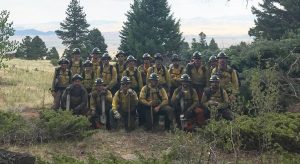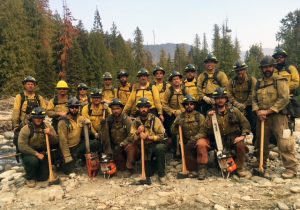DOVER, Del. — Delaware volunteer fire departments that respond to rural wildfires can apply for matching grants up to $4,500 from the Delaware Forest Service’s 2020 Volunteer Fire Assistance (VFA) Equipment Grant Program. Since its inception, the program has provided more than $350,000 to enhance wildfire response in the First State. The application deadline is Wednesday, May 13, with awardees notified by June 1. All requests must show a 50-50 match in either cash or in-kind services, such as volunteer hours spent on training or responding to field fires. Projects and purchases must be completed by August 1, 2020.
Grant materials are available at the links below:
- 2020 Volunteer Fire Assistance Program Grant Application (MS-Word)
- 2020 Volunteer Fire Assistance Program Grant Application (PDF)
“This is a great opportunity for volunteer fire companies to obtain wildland firefighting equipment at no cost to their company,” said Kyle Hoyd, Delaware’s assistant state forester who oversees its wildland fire program. “Brush unit upgrades, personal protective equipment (PPE), chainsaws for wooded operations—these are just a few of the items that can be obtained through this grant opportunity.”
All applications must received at the Forest Service’s Dover Headquarters (2320 S. DuPont Highway, Dover, DE 19901) by regular mail at the close of business (COB) on that day. No emailed or walk-in applications will be accepted. Applicants are asked to take note of the submission instructions at the bottom of the application.
Priority will be given to applicants that have:
- Not received VFA grant funding from the Delaware Forest Service in the past three years
- Members attend the 2019-2020 (S130/S190) wildland fire classes, and
- Members participate in the Delaware Forest Service’s 2020 annual fire camp.
Funding cannot be used for vehicles (trucks/UTV’s/ATV’s/Trailers), structural firefighting gear (turnout coats, hardhats, gloves, lights, rescue saws, etc.) can be purchased with this funding. Funding is for wildland firefighting ¾”-1.5” forestry hose, wildland nomex clothing, wildland hardhats, brush unit pumps/skids, and wildland fire hand tools. Chainsaws can be purchased with grant funds, however they cannot be used/modified into rescue saws.
If you have any questions about the application process or what can be purchased, please contact Kyle Hoyd at (302) 698-4548 or at Kyle.Hoyd@delaware.gov
 sent two full crews out to Colorado, Idaho, and Montana to be first responders.
sent two full crews out to Colorado, Idaho, and Montana to be first responders. Delaware has been mobilizing crews and individual resources to serve on out-of-state assignments since the late-1990s. Delaware firefighters have traveled to Alaska, California, Colorado, Georgia, Idaho, Minnesota, Montana, Nebraska, Nevada, New Mexico, South Dakota, Utah, Virginia, Washington, and Wyoming.
Delaware has been mobilizing crews and individual resources to serve on out-of-state assignments since the late-1990s. Delaware firefighters have traveled to Alaska, California, Colorado, Georgia, Idaho, Minnesota, Montana, Nebraska, Nevada, New Mexico, South Dakota, Utah, Virginia, Washington, and Wyoming.